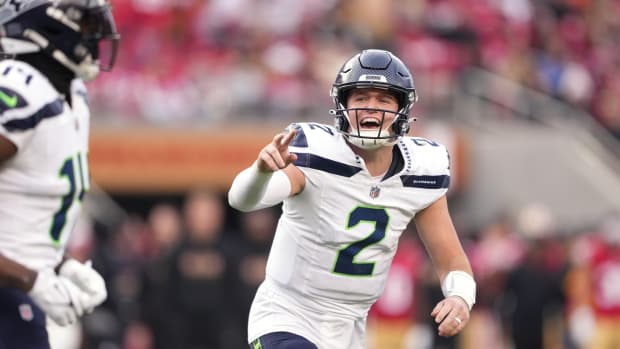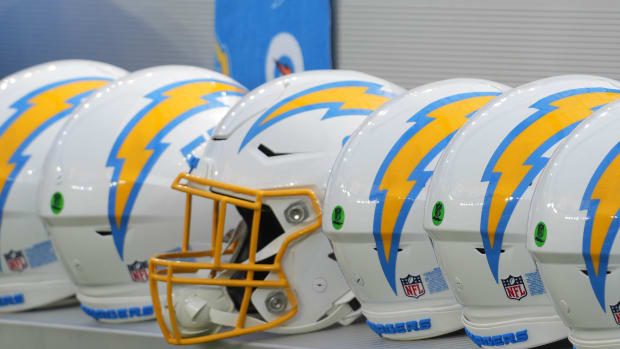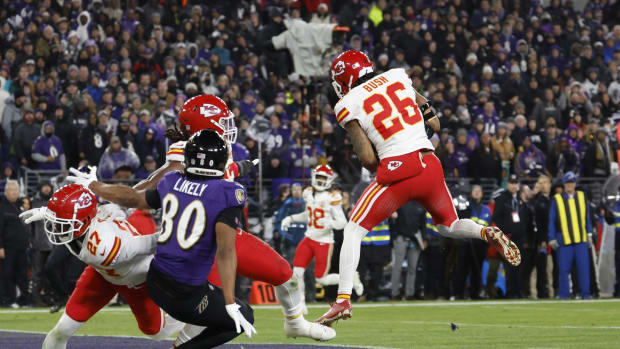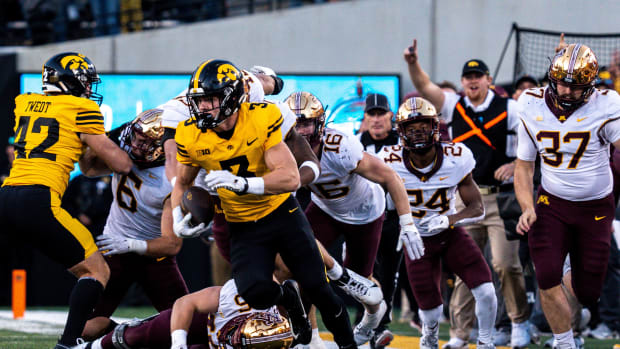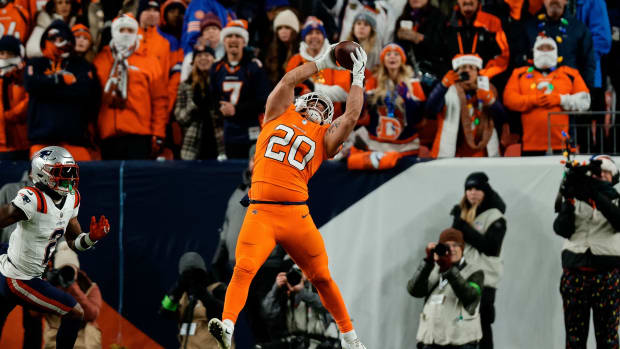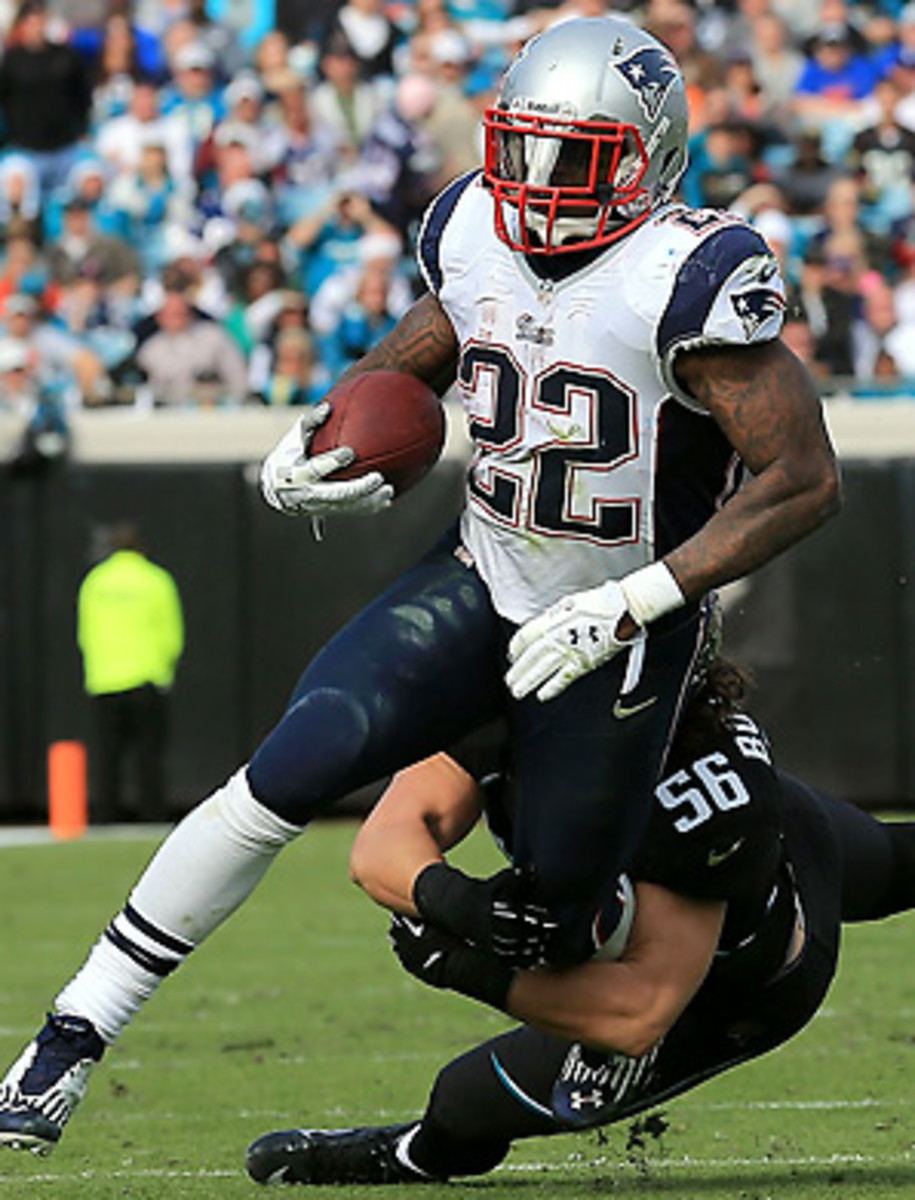
Behind Ridley, Pats might have rediscovered missing Super piece

In his first full season as the Patriots' top back, Stevan Ridley had over 1,300 total yards and 12 TDs.
Sam Greenwood/Getty Images
Bill Belichick is not overly concerned with building a consensus among his rank-and-file, as far as his team's offensive tactics. "I like keeping things balanced, absolutely," says his second-year left tackle, Nate Solder. "But the other thing I do is, they tell me the play, and I run it. It really doesn't matter if my opinion was, 'Run the ball less,' or 'Run the ball more.' I just do what they tell me." This is one reason why Solder will likely be the Patriots' left tackle for a very long time.
Between 2005 and 2011, the tactics of Belichick and of his offensive coordinators -- first Josh McDaniels, then Bill O'Brien and then, starting with last season's playoffs, McDaniels again -- worked exceedingly well. The Patriots every year finished in the league's top 10 in points scored, and in its top 11 in total yards. They did so, largely, on the strength of the arm of Tom Brady, and of the hands and legs of his collection of talented receivers.
Even though New England devoted a disproportionate number of plays between '05 and '11 to running out the clock against overmatched opponents -- the team won 86 regular season games during those seven seasons, nine more than anyone else -- it ranked in the NFL's top five in rushing attempts just once, in 2008, when a torn ACL ended Brady's season in Week 1. It ranked in the top five in passing attempts three separate times.
Such a relative imbalance was by and large not a problem for Belichick's Patriots. Until, almost every year, it suddenly became a major one. Despite its regular season successes, New England has not won a Super Bowl since 2004, and the one-dimensional nature of its attack -- even though that dimension was very, and in some cases historically, productive -- time and again proved a central reason why.
The team's six playoff losses in the past seven seasons (Matt Cassel, Brady's replacement in '08, could not quite lead them to the postseason that year) have all come to elite teams who had it in them, to varying degrees, to slow New England's aerial attack. The Patriots found themselves bereft of a running game to which to turn, or at least with which they might mix things up. In those six defeats, to the Broncos, Colts, Giants (twice, in the Super Bowl in `07 and `11), Ravens and Jets, the Patriots, who between '05 and '11 averaged a league-high 28.8 points per regular season game, scored an average of 18.7. They rushed, as a team, for an average of just 79.7 yards, surpassing the 100-yard mark only once.
BURKE: HOW WILL TEXANS STOP VINCE WILFORK?
The issue was partly one of personnel. In those seven seasons, Belichick and his coordinators did not have at their disposal the type of running back who can take over a crucial playoff game, cycling through solid if underwhelming options like Laurence Maroney, BenJarvus Green-Ellis, Sammy Morris and Kevin Faulk. Much of the blame can be placed on the head coach, the franchise's architect. But the issue was also one of philosophy. The Patriots lived and died on their passing. In each season, they died.
The 2012 Patriots -- who are at this moment preparing for yet another playoff run, which will begin in Foxboro against the Texans this Sunday afternoon -- are substantially different from any of their seven preceding iterations. In fact, in construction and tactics, the team looks more like those 2004 champions than any that have come since. That '04 team, behind Corey Dillon's 1,635 yards, ranked seventh in the league in rushing yards, and fifth in attempts, with 524.
PETER KING'S DIVISIONAL ROUND PICKS
This year's Patriots ran the ball 523 times, more than they had in any season since '04 and more than any other team in the league save the Seahawks, and they again ranked seventh in rushing offense. They did so thanks to a collection of young backs that includes Brandon Bolden (an undrafted rookie out of Mississippi), Shane Vereen (a second-rounder, from Cal, in 2011) and Danny Woodhead. But they did it, more than anything, thanks to Stevan Ridley.
Ridley, the 23-year-old 2011 third-rounder from LSU, has had some trouble holding onto the football during his relatively brief pro career. He fumbled during last season's playoff opener, against the Broncos, and was thereafter benched for the postseason's remainder in favor of the historically sure-handed Green-Ellis, who is now a Bengal. His four fumbles in the 2012 regular season were exceeded by only two other running backs, Willis McGahee and Jamaal Charles. When the ball remains firmly in his hands, however, Ridley in 2012 established himself as the first Patriots tailback of anything approaching star caliber since Dillon.
Ridley's 1,263 rushing yards were seventh in the NFL, fourth-most in franchise history and the most, by 255, by a New England back since Dillon's '04 team record. The Patriots gained 6,846 total yards during the regular season, the fifth-most by any team ever. That output was two yards fewer than the offense accumulated last season, but the difference was in its balance: led by Ridley, it outrushed last year's by 420 yards, an increase of nearly 24 percent.
This year's offense, in other words, is more dynamic than 2011's, and than any since 2004's, and far less likely to falter when it matters most, if Brady finds himself frustrated. Ridley is aware of his importance. "Our offense is more potent when it's balanced -- that's what the coaching staff knows, and that's why they put me in position to make the plays," he says. "Teams are looking at Brady first, the best quarterback to ever play the game, but at the same time they're overlooking the running game."
The production of Ridley, and of his fellow backs, allowed the Patriots to weather injuries this season to the matchup nightmares that are tight ends Rob Gronkowski and Aaron Hernandez, who played just four games on the field together. Now, though, both are fully healthy, and Ridley is not alone in his belief that the fifth-best offense of all-time is about to get even better. "Like any other team in the league, we've been battling injuries, but we have two of the best tight ends in the game right now," he says. "To have those two guys back, it seems to me that our team is coming together at the right time. We just have to play Patriot football, and we can only do that if we have all our players in."
Gronkowski, who suffered a fractured forearm in mid-November, missed the Patriots' regular season game against then 11-1 Houston, a 42-14 romp in which the offense fired on all cylinders, even while missing the star. They torched the Texans for 419 total yards, and they did so in their newly balanced way. Brady threw for 296 yards, and the Patriots rushed for 130 -- 72 of which, on 18 carries, came from Ridley.
It is very difficult to imagine much changing this weekend, with Gronkowski joining not only Hernandez but top wideouts Brandon Lloyd and Wes Welker, and with all of them now credibly supported by Ridley. Ridley's main task, in fact, will be to ensure that the ball is not punched out of his grip. "It's one thing the New England Patriots have never put up with, never accepted," Ridley says, of fumbling. "You gotta keep it high and tight, over your heart. You've got to have two hands on the ball.
"I've got to be dependable," he adds, "so that they can call my number, and have full confidence in the playoffs." If the Patriots can do that, then it is likely that their run of seven straight ultimately unsuccessful seasons will not extend to eight.
































